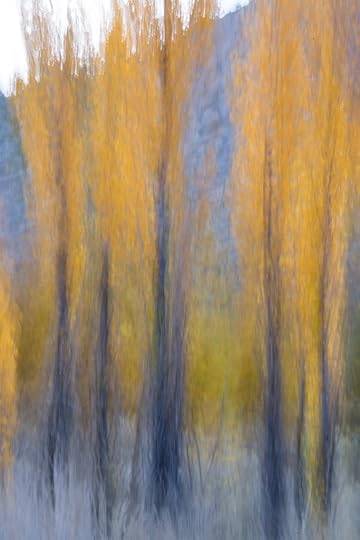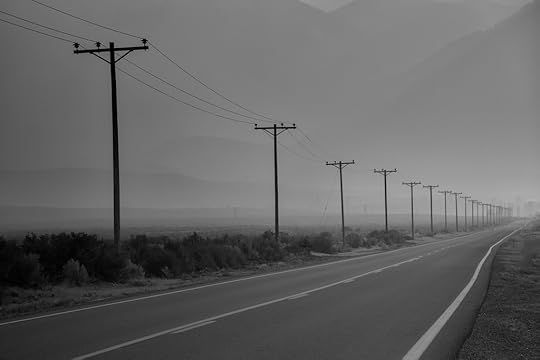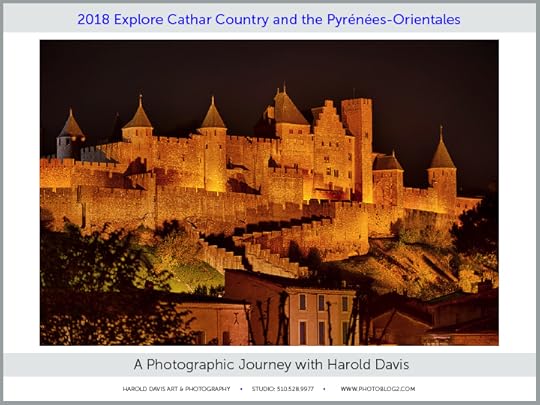Harold Davis's Blog, page 98
October 23, 2017
Forgotten Kingdom
When you wander the desert of the imagination you don’t know what you might find—the possibilities range from a horse with no name to forgotten kingdoms of myth and legend and beyond.

Forgotten Kingdom © Harold Davis

October 22, 2017
Revelation
While my night photography group turned most of their attention to Mobius Arch, I set my camera on auto-pilot on a rocky knoll to photograph the apparently empty landscape of Alabama Hills. The star trails in this image were created from a stack of 37 4-minute exposures, each exposure at ISO 400 and f/2.8. The foreground was blended in at roughly 90% opacity, and consists of an HDR blend of three exposures made at ISO 64, f/22, with shutter speed varying between 0.3 and 3 seconds. I used my Zeiss 15mm f/2.8 throughout.
I think the coolest thing about night photography is never knowing what the camera will reveal—certainly more than the eye can see!

Revelation © Harold Davis

October 20, 2017
Landscape of Blue Layers
From the heights of the White Mountains, the ranges to the south looked blue in the haze. With very little intermediation from me, photographic capture turned these vast spaces into a layered landscape of a near abstract quality.

Landscape of Blue Layers © Harold Davis

October 19, 2017
Night Finger Music
A few of us arrived in Lone Pine ahead of this weekend’s night photography workshop. After dinner, we went over to the Alabama Hills to practice a little night finger music—and to experience anew the wonder of the stars in the firmament.
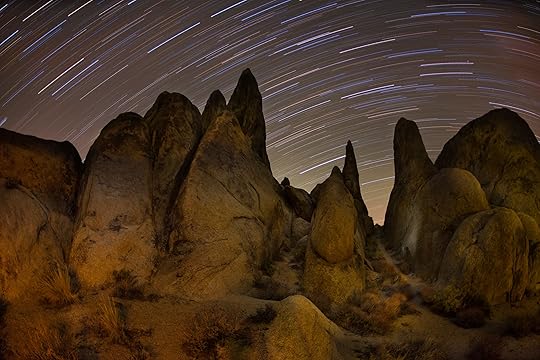
Night Finger Music © Harold Davis

October 18, 2017
Autumn Poplars
In the early morning light I photographed poplars in the golden hues of autumn. Then I experimented with longer exposures and motion. This impressionistic result was a 3 second exposure with the camera on a tripod; I moved the camera up and down for the last half of the exposure.

October 17, 2017
Lonely Road
I had hoped to leave the haze and smoke of the Bay area behind, but coming across Yosemite and then down the eastern slope of the High Sierra we descended into a miasma. As the light and visibility faded, I stopped beside a lonely road to photograph the line of telephone poles fading into the scarcely visible mountains in the distance.

October 16, 2017
Early-Bird Discount: Exploring Cathar Country and the Pyrenees-Orientales
Please consider joining me on a grand photographic adventure to southwest France in spring 2018: Exploring Cathar Country and the Pyrenees-Orientales (April 28-May 7, 2018). A substantial early-bird discount ($500 per person) applies for reservations accepted by Nov 15, 2017. Click here for more information about Cathars and Cathar country, here for a detailed day-by-day itinerary (PDF), and here for the Reservation Form.

October 13, 2017
Opening in Night Photography Workshop Oct 20-23
Due to a cancellation, we have an opening in our upcoming night photography workshop in the Eastern Sierras Oct 20-23, 2017. Click here for more info and registration. It’s not to late to join a group of compatible night photographers in Lone Pine next weekend to enjoy the stars and night skies! A $50 discount is available.

Stars My Destination © Harold Davis

October 11, 2017
It Starts with a Petal and Ends with a Twist of Fate
It started with two wonderful bunches of alstromerias (“Peruvian Lilies”), one purple and one yellow. On the alstromeria flower, the blossoms have exterior petals that are mostly solid colors (e.g., somewhat translucent, but without markings). In addition, there are usually three interior petals on each blossom that are mostly “tiger striped”—and great for transparency on the light box. You can get a good close-up look at both kinds of alstromeria petals in another of my blog stories.
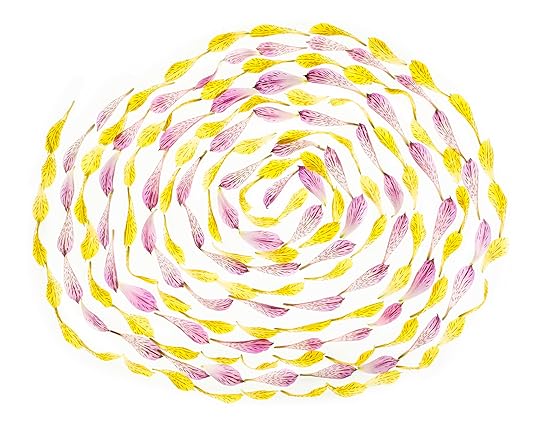
Alstromeria Petal Mandala © Harold Davis
After we’d enjoyed the flowers for a while, I decided to use the interior, tiger-striped petals to make a pattern. My idea was to create two concentric spirals, one from the purple petals, and one from the yellow petals.

A Simple Twist of Fate © Harold Davis
This is a design that is somewhat maze-like in nature, and I have been drawing this double spiral as long as I can remember (essentially, this is a floral version of the doodle that got me through the boredom of law school many years ago!). The finished version, depending on how you look at things (and I have heard all of these by now), can be a maze, the spiral galaxy, a school of fish, human spermatozoa, a giant’s fingerprint—or even (in the school of a pipe sometimes just being a pipe!)—flower petals.
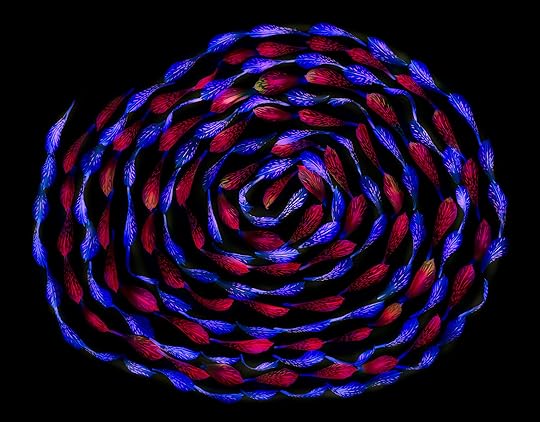
A Simple Twist of Fate 2 © Harold Davis
With the version on white (shown at the top of this story) I thought I was done, but of course, for the wicked as for the artist, there is never any rest! No, I in truth I am not seriously wicked. Alas, as much as I might like to be a Tom Petty and the Heartbreakers “bad boy” I am probably not wicked at all.
I had great fun inverting the original image in LAB color in Photoshop, creating a straight “translation” of whites to black and blacks to white (the “straight” LAB inversion is the first A Simple Twist of Fate image above).

A Simple Twist of Fate 3 © Harold Davis
Looking at the simple inversion, I immediately I thought of Paul Klee, and color field painters such as Kenneth Noland and Larry Poons from the 1960s. This made me feel impelled to have fun with more complex LAB manipulations, shown here with a black background.
As you can see, it all started with a flower petal, and ended in a simple twist of fate! Of course, the intermediate steps required a certain delicacy in handling and “drawing” with flower petals, not to mention expertise in high-key HDR photography, Photoshop workflow, and creative uses of LAB.
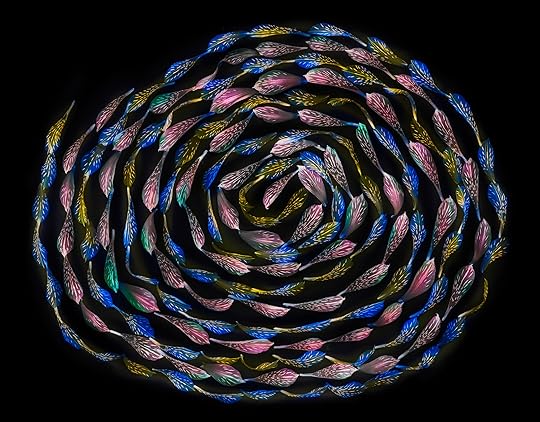
A Simple Twist of Fate 4 © Harold Davis
Which version is your favorite (and how twisted is fate?)?
I am looking forward to printing these six images as an ensemble. A very special thanks (and a very deep discount) to any of my collectors (or a new collector) who would like to place an advance order for one of these prints—or, better yet, for the suite of all six prints (contact me to discuss, or if interested, for details of this offer)!

A Simple Twist of Fate 5 © Harold Davis

October 10, 2017
Chorus of One
I worked with model Jin N Tonic to create a number of images in my Multiple Exposures series. In Chorus of One, I think Jin did a great job of positioning and placement (as well as having enthusiasm, and looking a bit like Marilyn). Jin’s ability to precisely place her body helped to create a sense of pattern across the eight times the strobes fired (each one being an exposure that was combined in-camera using its multiple exposure capability).
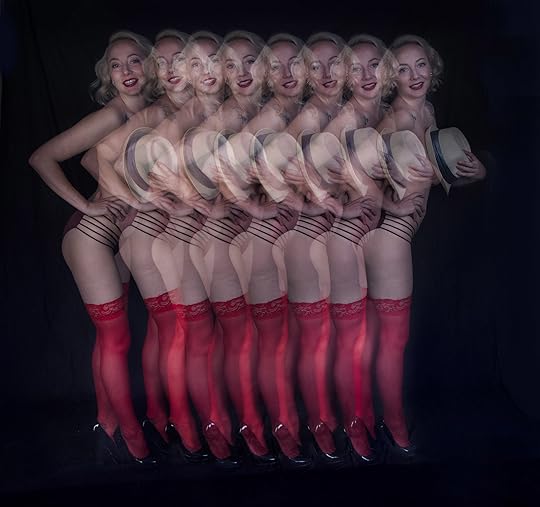
Chorus of One © Harold Davis
My Multiple Exposure images use choreographed, in-camera multiple exposures to create an almost stop-motion effect. I like what one can do with this approach, because it combines a technique as old as photography (in-camera multiple exposures) with the full power of modern digital technology. Why, I remember when…to make a multiple exposure on my old Nikon FM-2 you had to press a little button next to the wind lever, to fool the camera into thinking you had actually advanced the film to a new frame. Very mechanical, and yes it was possible to foul it up. Today, it is just a menu item.
Boys and girls, if you try this at home, remember to leave Autogain set to On; this is what balances the separate exposures together instead of letting brighter exposures prevail.


